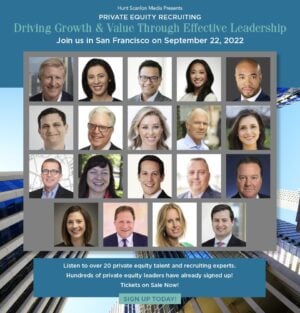What Defines an Effective Recruiting Team

May 3, 2022 – For many businesses, recruiting top talent and the right talent can be a challenge. Looking for the most qualified person for each role as well as cultural fit is always the challenge, says Sheila Greco, of SGA Talent, in a new report. “Now more than ever a company’s recruiting team and recruiting partners need to be qualified to help attract the right talent the company requires to be competitive,” she said. In the report, Ms. Greco discusses what recruiting is, how it works, how it differs from hiring, and how an effective recruiting team can help get the talent needed.
Recruiting is simply the process of identifying, engaging, recruiting, vetting, and presenting the most qualified candidates for each role, said Ms. Greco. “It is a full-time job that requires focus, discipline, the ability to follow a recruiting process that involves creating a targeted talent pool, connecting, emailing, calling, and searching to find the ideal candidates,” she said. “Now more than ever, recruiters need to be proactive, reaching out, and selling the opportunities companies are offering. Posting jobs is no longer enough, especially now with the Great Resignation upon us. Recruiting today needs to be proactive and recruiters need to be sales people who can persuade candidates who possess the qualities and skill-set the company needs to fill each role.”
Why Companies Need to Focus on Recruiting, Not Just Hiring
A company’s success is based on having top performers who can work as individuals and work well with a team. “That said, whether a company is looking to replace an individual, fill an opening, build a team, or simply add a team player, recruiting the best talent for the team is a necessity, not just hiring someone for the role,” said Ms. Greco.
“There is a difference,” she said. “Having the right recruiting team in place with a focus on recruiting the right talent is important to every business and again helps companies compete. Great recruiters know the difference between good talent and excellent talent, with the ability to present professionals who will thrive within the organization.”
Recruiting is Different than Hiring
Hiring is often reactive, while recruiting is a process to identify and recruit the most qualified candidate for the role, according to Ms. Greco. “Reactive hiring is usually in response to an employee leaving,” she said. “As for recruiting, it is a process to identify the right talent and involves an in-depth search to get to the most qualified for the role. Recruiters are professionals who will search for candidates who have the skillsets and qualifications that align with each role.”
Ms. Greco says recruiting is a process and that most recruiters follow these steps:
- Kick-Off Call
- “This is the start of the recruiting process where the opening(s) are discussed in detail, including reviewing the job descriptions, articulating the musts, the needs, the wants of the professional as well as the agreed upon process that will be used as it relates to candidate pipeline and interview process,” Ms. Greco said.
- Building the Talent Pool
- This step is critical to the recruiting process because it acts as the foundation of the search. Ms. Greco says that the qualified candidate will most likely come from the talent pool or as a result of a referral.
- Start Recruiting
- This process includes connecting with those in the talent pool via email, telephone, LinkedIn Messaging, and more. “It also requires the step of reaching out to those in the recruiter’s engaged talent communities, a great way to fill the candidate pipeline as well as network,” said Ms. Greco. “The result of these recruiting efforts help build the candidate pipeline short list of interested, qualified candidates.”
- Filling the Candidate Pipeline and Prepare for the Interview
- Once the recruiter creates the short list, it is time to discuss each prospect with the hiring team and decide which candidates will move on to the interview stage.
- Offer
- Depending upon the client, either the recruiter or the hiring manager will make the offer.
Why it is important to have the right recruiting team to support a company’s recruiting needs? “Whether a company has its own recruiting team, works with an outside partner, or uses a combination of both, having the right recruiting team in place makes a difference when recruiting the right talent,” said Ms. Greco. “Since recruiting is a process and requires proactive recruiting strategies, it is important to remember that in today’s market recruiters need to seek out talent, as talent is not applying for jobs like they did in the past.”
 Executive Search Firms Shatter Growth Records
Executive Search Firms Shatter Growth Records
Hunt Scanlon Media has released its annual rankings of leading executive search firms. In the U.S. and globally, billions of dollars poured into the high-end recruiting sector in 2021, a result of pent-up demand for executives and their key reports. According to data analysis conducted by Hunt Scanlon, 48 of the 50 largest U.S. recruiting firms enjoyed double digit growth in 2021. Let’s recap the current state of the industry . . . and make some predictions.
Established in 1989, SGA Talent combines the continuity and business acumen of a 28-year-old recruitment research and strategic recruiting solutions company with a practical forward-looking, results-driven approach. The firm is based in Amsterdam, NY.
Ms. Greco is a proven leader with over 30 years of recruiting experience. In addition to managing the firm, she leads SGA Talent’s engagements for senior-level positions for many of the company’s longstanding clients, with a particular expertise in professional services, healthcare, consumer packaged goods, and manufacturing. As an industry expert, Ms. Greco has developed trusted relationships with talent acquisition leaders and human resources professionals at Fortune 1000, start-ups, as well as emerging growth companies.
Related: Assessing Soft Skills to Land Your Next Top Hire
Contributed by Scott A. Scanlon, Editor-in-Chief; Dale M. Zupsansky, Managing Editor; and Stephen Sawicki, Managing Editor – Hunt Scanlon Media













